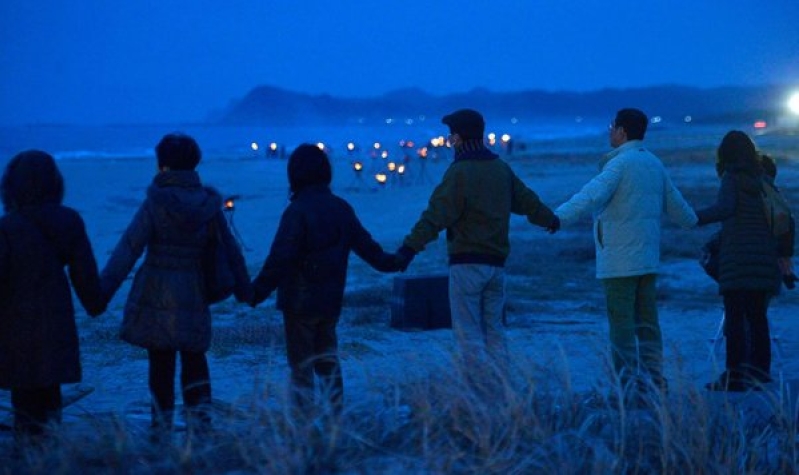
Yesterday was the second anniversary of Japan’s 311 major earthquake. Due to events such as the Korean Peninsula situation, the Vatican’s closed-door election of a new Pope, and the Diao-yu Island turmoil, this very memorable day was commemorated modestly by many international media groups.
However, “New York Times” is one international media group that paid attention to the second anniversary of Japan’s 311 event. The “New York Times” article focused on the Fukushima First Bible Baptist Church that was situated within the radius of nuclear radiation, and introduced the lifestyle of followers in this region including their positive outlook on life.
Although the article did not refer directly to God, Jesus Christ, or Biblical teachings, the reader could easily comprehend, through the lifestyle of the followers in the affected regions, that “what holds them up and provides the power to be brave and to go forward at times of trials originates from the Christian belief”.
Situated in Iwaki within the Fukushima Prefecture of Japan, the Fukushima First Bible Baptist Church held an opening worship ceremony in the past Sunday in the newly built chapel, and simultaneously commemorated the disaster comrades of Japan’s 311 major earthquake that occurred 2 years ago.
The 50 or so attendees at the opening ceremony had mixed feelings. On the one hand, the Church finally ended the two-year long nomadic format which called for celebration; but on the other hand, the road to rebuilding the country is still long. Faced with the cruel memories and reality, even the most reverent follower may face the test of faith.
No matter what, the Fukushima First Bible Baptist Church, filled with the hope and faith of some 50 members, brought many surprises to the vastly affected Japanese population along the harsh road of reconstruction. These little chunks of success can certainly help bring hope and renewed energy.
This Church built a new cozy chapel in the windy city of Iwaki, approximately 30 miles (48 kilometers) south of the nuclear plant. Many members who were scattered in various regions in Japan could not attend the opening ceremony held last Sunday for various reasons.
Japan’s 311 major earthquake/tsunami caused leakage from the Fukushima nuclear plant. The island of “Fukushima”, which was severely affected by nuclear radiation, had truly embraced its Chinese-translated name that sounded like “island of radiation”. The island was like a piece of wasteland, unsuitable for living. Thus, the Fukushima First Bible Baptist Church became a spiritual pillar and a land of sanctuary for the local people.
The article reported the experience of its first convert, the now 92-year-old Tomoko Sasaki, during the 311 major earthquake. She recalled waiting in the cold for 6 hours for the Self Defence Forces bus to come and transport her to safe shelter in a nearby arena.
In the chaotic first 3 weeks, Tomoko stayed with some 60 members of the region, travelling back and forth between several other evacuation sites. She is now settling in a seniors’ home in Tokyo this year, and hopes to spend her coming years in this place.
Recalling the days of evacuation, Tomoko expressed with sentiments that humanly efforts alone could not possibly have helped her live through the entire evacuation process; without the support of the Christian faith, she would not have reached this day.
Being the first local member of the Fukushima First Bible Baptist Church, Tomoko had felt substantial pressure. When she was baptized 65 years ago, her neighbors viewed her with prejudiced eyes, because the Japanese society at that time could not yet accept citizens converting to Christianity.
Many years passed, and Tomoko felt that the number of Christians in today’s Japan is still not numerous. This is all the more reason for Christians to stay together and care for each other.
Tomoko’s story is a reflection of many in the Fukushima First Bible Baptist Church. The article also pointed out, that although the Church is faced with many challenges, it also radiates livelihood. A family of seven, who had decided to evacuate with the Church, was baptized in this Church, which gave hope and a positive outlook to many members.
When trials happen, many people, including followers of Christ, will ask a list of questions. In the opening ceremony held last Sunday in the new chapel, the Church’s assistant Pastor, Masashi Saito, reflected on this topic anew, “At times, we feel that we have lost something precious to us, and we will ask: ‘God, why is this happening?’”
The article did not provide the answer to this question. However, the Church’s director, Pastor Sato Akira, during the 311 first anniversary Taiwan-wide tour, shared his miraculous experiences in the process of rebuilding the home and the Church with tears. His sharing included family members of many followers getting baptized and returning to God in the process.
To Pastor Sato Akira, this disaster was God’s training for Japan, which marked the beginning of the revival of the Church. He believes that this is God opening the Gospel door for Japan, when brothers and sisters more sincerely pray for the Church and non-believers, with a wish that man’s spiritual wounds be healed by the Gospel, so that man can continue to live with hope.
Yesterday, exactly one year after Pastor Sato Akira’s heartfelt sharing, the curtains were pulled back at the opening ceremony of the new chapel of the Fukushima First Bible Baptist Church. This was not only a memorable landmark for the rebuilding of the Fukushima disaster region, but, to many Christians, the beginning of the revival of Fukushima as well as Japan.
[Editor's note: Carol Lee translated this article.]






